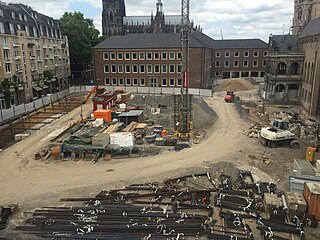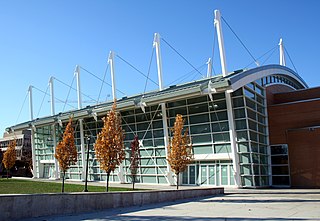Related Research Articles

Civil engineering is a professional engineering discipline that deals with the design, construction, and maintenance of the physical and naturally built environment, including public works such as roads, bridges, canals, dams, airports, sewage systems, pipelines, structural components of buildings, and railways.
Software engineering is an engineering approach to software development. A practitioner, called a software engineer, applies the engineering design process to develop software.

Infrastructure is the set of facilities and systems that serve a country, city, or other area, and encompasses the services and facilities necessary for its economy, households and firms to function. Infrastructure is composed of public and private physical structures such as roads, railways, bridges, tunnels, water supply, sewers, electrical grids, and telecommunications. In general, infrastructure has been defined as "the physical components of interrelated systems providing commodities and services essential to enable, sustain, or enhance societal living conditions" and maintain the surrounding environment.

A civil engineer is a person who practices civil engineering – the application of planning, designing, constructing, maintaining, and operating infrastructure while protecting the public and environmental health, as well as improving existing infrastructure that may have been neglected.

An audit is an "independent examination of financial information of any entity, whether profit oriented or not, irrespective of its size or legal form when such an examination is conducted with a view to express an opinion thereon." Auditing also attempts to ensure that the books of accounts are properly maintained by the concern as required by law. Auditors consider the propositions before them, obtain evidence, roll forward prior year working papers, and evaluate the propositions in their auditing report.

Construction is a general term meaning the art and science of forming objects, systems, or organizations. It comes from the Latin word constructio and Old French construction. To 'construct' is a verb: the act of building, and the noun is construction: how something is built or the nature of its structure.
A project manager is a professional in the field of project management. Project managers have the responsibility of the planning, procurement and execution of a project, in any undertaking that has a defined scope, defined start and a defined finish; regardless of industry. Project managers are first point of contact for any issues or discrepancies arising from within the heads of various departments in an organization before the problem escalates to higher authorities, as project representative.
A professional association is a group that usually seeks to further a particular profession, the interests of individuals and organisations engaged in that profession, and the public interest. In the United States, such an association is typically a nonprofit business league for tax purposes. In the UK, they may take a variety of legal forms.

The American Society of Civil Engineers (ASCE) is a tax-exempt professional body founded in 1852 to represent members of the civil engineering profession worldwide. Headquartered in Reston, Virginia, it is the oldest national engineering society in the United States. Its constitution was based on the older Boston Society of Civil Engineers from 1848.
The American Institute of Chemical Engineers (AIChE) is a professional organization for chemical engineers. AIChE was established in 1908 to distinguish chemical engineers as professionals independent of chemists and mechanical engineers.
The Cockrell School of Engineering is one of the eighteen colleges within the University of Texas at Austin. It has more than 8,000 students enrolled in eleven undergraduate and thirteen graduate programs. Annual research expenditures are over $267 million and the school has the fourth-largest number of faculty in the National Academy of Engineering.
Engineering ethics is the field of system of moral principles that apply to the practice of engineering. The field examines and sets the obligations by engineers to society, to their clients, and to the profession. As a scholarly discipline, it is closely related to subjects such as the philosophy of science, the philosophy of engineering, and the ethics of technology.
The United Nations Office for Project Services (UNOPS) is a United Nations agency dedicated to implementing humanitarian and development projects for the United Nations System, international financial institutions, governments and other partners around the world, with a focus on infrastructure, procurement and project management The organization's global headquarters is located at the UN City campus in Copenhagen, Denmark. UNOPS delivers around $3 billion worth of development projects for its partners every year. Its activities have ranged from managing the construction of schools in Afghanistan, to building shelters in Haiti, to procuring ambulances to support the Ebola response in Liberia.

Rafael Luis Bras is a Puerto Rican civil engineer best known for his contributions in surface hydrology and hydrometeorology, including his work in soil-vegetation-atmosphere system modeling.
The American Academy of Environmental Engineers and Scientists (AAEES) is a society of professional engineers and scientists who have demonstrated special expertise in environmental engineering or science beyond that normally required for professional practice. The principal purpose of the Academy is serving the public by improving the practice, elevating the standards, and advancing public recognition of environmental engineering and science through a program of specialty certification, similar to that used in healthcare and other professions.
Humanitarian engineering is the application of engineering for humanitarian aid purposes. As a meta-discipline of engineering, humanitarian engineering combines multiple engineering disciplines in order to address many of the world's crises and humanitarian emergencies, especially to improve the well-being of marginalized populations.

Architectural engineering or architecture engineering, also known as building engineering, is a discipline that deals with the engineering and construction of buildings, such as environmental, structural, mechanical, electrical, computational, embeddable, and other research domains. It is related to Architecture, Mechatronics Engineering, Computer Engineering, Aerospace Engineering, and Civil Engineering, but distinguished from Interior Design and Architectural Design as an art and science of designing infrastructure through these various engineering disciplines, from which properly align with many related surrounding engineering advancements.

The American Council of Engineering Companies (ACEC) is the oldest and largest business association of engineering companies. It is organized as a federation of 52 state and regional councils with national headquarters in Washington, D.C., comprising thousands of engineering practices throughout the country. It administers extensive lobbying and education programs.
Triple bottom line cost-benefit analysis (TBL-CBA) is an evidence-based economic method that combines cost–benefit analysis (CBA) and life-cycle cost analysis (LCCA) across the triple bottom line (TBL) to weigh costs and benefits to project stakeholders. The TBL-CBA process quantifies total net present value, return on investment, and project payback. TBL-CBA uses location-specific data to give asset owners and design professionals the flexibility and capability to provide a rigorous analysis of investment alternatives through all stages of planning and design.

The Fraunhofer Institute for Systems and Innovation Research is part of the Fraunhofer Society for the promotion of Applied Research e.V. (FhG), Europe’s largest application-oriented research organization. The institute is based in Karlsruhe. It conducts applied research and development on innovation in engineering, economics, the natural sciences and social sciences. The Fraunhofer ISI is one of the leading institutes for innovation research in Europe.
References
- 1 2 "Envision". American Society of Civil Engineers. Archived from the original on 2019-08-26. Retrieved 26 August 2019.
- ↑ "Team Members". Institute for Sustainable Infrastructure. 7 May 2019. Retrieved 10 September 2024.
- ↑ "About ISI - Institute for Sustainable Infrastructure". 2019-04-25. Retrieved 2024-09-10.
- ↑ "Use Envision - Institute for Sustainable Infrastructure". 2019-05-01. Retrieved 2024-09-10.
- ↑ "Verify A Project - Institute for Sustainable Infrastructure". 2019-05-02. Retrieved 2024-09-10.
- ↑ "Envision Sustainability Professional (ENV SP) - Institute for Sustainable Infrastructure". 2019-05-01. Retrieved 2024-09-10.